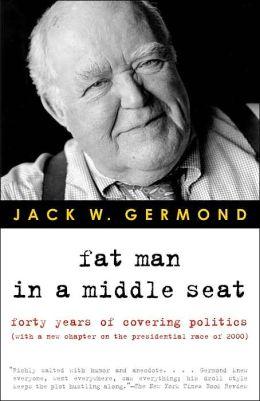Jack W. Germond, who died at the age of 85 Aug. 14, looked like a newspaper guy, talked like one, too, and lived like one. If respect and reputation are the coin of the realm in the business of reporting and print journalism, Germond was one very rich guy.
He was a print man through and through, but he also struck an unforgettable figure on television, most famously with “The McLaughlin Group.” Germond made every guy who took on beats, wrote about crime or back room politicians out of the limelight and who would never look like Brian Williams, feel a twinge of hope. Heck, more than a twinge.
A large man, he poked fun at his looks, his business and himself often, a rare quality in a field that has more egos than a surgeon’s convention. In a town and region in which you could run across a syndicated columnist without half trying while walking the dog, Germond stood out. He was Washington bureau chief for Gannett Newspapers, wrote a column for the Baltimore Sun and wrote about politics loaded with inside information from inside informants—so much so that he acquired a reputation of writing the truth, getting the story and maintaining his larger-than-life soul.
He wrote—sometimes with Jules Witcover—books galore about Washington and politics, about elections, plus two memoirs about the large shadow he cast: “Fat Man in a Middle Seat: Forty Years of Covering Politics” and “Fat Men Fed Up: How American Politics Went Bad”. He rose to prominence in Washington coming out of New York state covering politics there in the late 1950s, as good a training grounded for immersion into the game of politics as you probably can get.
Germond would be the first to admit that if you put him into a thousand-dollar suit, he could reduce it to a hundred-dollar suit just be sitting down. According to the Washington Post, he said he was “a fat, bald guy who looked unkempt even in a freshly pressed suit and a Brooks Brothers shirt, who played poker and the horses rather than golf, who didn’t give dinner parties except for friends and who sometimes drank too much.” He worked for the Washington Star until it folded and went to the Baltimore Sun, until he retired in 2001. He also appeared on TV talk shows, such as “The McLaughlin Group,” where he took on the role of defender of the liberal faith.
And still he wrote. Before and after retirement, he wrote, the “Politics Today” columns with Witcover, and the books he wrote with him: “Blue Smoke and Mirrors: How Reagan Won and Why Carter Lost the Election of 1980” and “Whose Broad Stripes and Bright Stars? The Trivial Pursuit of the Presidency 1988.”
When Germond died, he had just finished writing his first novel, “A Small Story for Page 3”. Naturally, the hero was a reporter. Sadly, there won’t be a second. -30-


